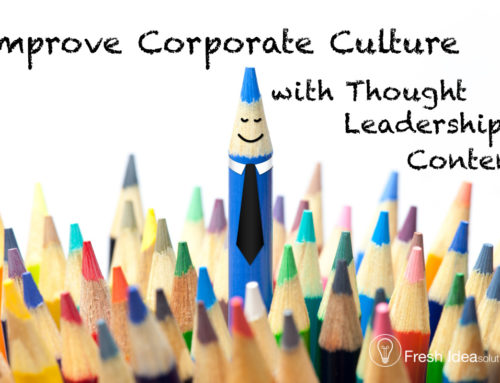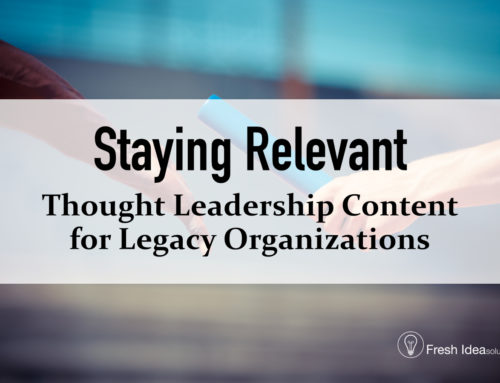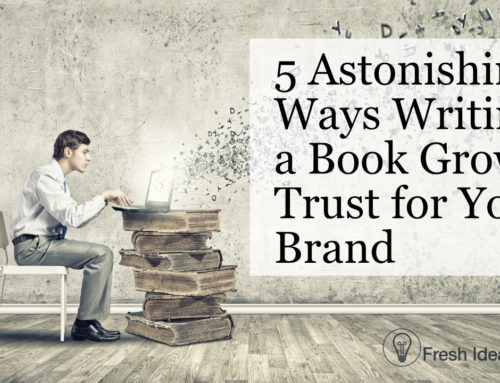Penn State, Michigan State, Ohio State — and now… community foundations. These scandals tarnish the integrity of higher education and nonprofit brands. With the exposing light of the #metoo movement shining brightly, your content marketing can be a powerful way to promote brand trust and transparency.
Even today, the Information Age is shaking up marketing in the nonprofit world.
As higher ed marketing expert Bart Caylor put it, we’re moving from a Mad Men-style advertising to Carnegie-style influence.
| Mad Men-style Marketing | Carnegie-style Marketing |
|---|---|
| Advertising | Friend-raising |
| Promotion | Informing |
| Publicity | Conversation |
| Hype | Influence & Caring |
There’s a lot to be excited about! But like the Industrial Age that came before it, the Information Age has its dark side, too.
Industrial Age Triumph & Moral Failure

By John Leech – Public Domain
When the Industrial Age dawned, many hailed it as a pivotal moment in the evolution of humankind, with utopia sure to follow.
Yet with all its promises of bringing leisure and luxury into our lives, the Industrial Age found ways to draw out the very worst in humanity.
For example, the Industrial Age accelerated the evil of child labor and abuse, a human right issue immortalized by Charles Dickens in A Christmas Carol.
None of the optimists foresaw the evils to come with the Industrial Revolution.
The Floodlight
In the same way, I doubt anyone foresaw the tidal wave of accusations coming to tarnish the brand trust of our most revered institutions in the Information Age.
The sex abuse scandal at Penn State still haunts the university.
Michigan State has a long road ahead of them after 250 victims have come forward with their allegations.
Similarly, Ohio State is under scrutiny according to the Chronicle of Higher Education as allegations of sexual misconduct are coming to light.
The devastation these brands have experienced due to breaches of public trust could not have happened at any other time in history. The Information Age made this possible.
To be clear, these scandalous evils weren’t caused by the Information Age, but the Internet and social media have empowered individuals to bring these abuses to light.
The Darkside of the Fundraising Profession
Then, things got worse when I read this post from fundraising consultant Michael Rosen.
Rosen made the case that Silicon Valley Community Foundation’s top fundraiser Mari Ellen Loijens’ “emotionally abusive and sexually inappropriate behavior” would have a negative effect on the fundraising profession if nothing was done about it.
If professional fundraisers fail to act, the entire fundraising profession will become complicit with those who embrace the dark side of fundraising. Furthermore, if we’re not seen as self-policing, we open the door for others to step-in with licensure requirements to hold the profession accountable.
The wrong actions of even one person hurt us all.
University scandals hurt the integrity of all colleges and university brands. And the Silicon Valley Community Foundation scandal affect all of us in the fundraising profession.
My Prediction
Based on all of this, I make two assumptions:
Assumption 1: The floodlight of the Information Age will only grow brighter, revealing more of the corruption within societal institutions.
Assumption 2: Learning will continue to be democratized, making knowledge even more readily available.
This leads to some sobering conclusions:
Conclusion 1: Knowledge is in great supply, so what a person knows will become less valuable over time.
Conclusion 2: Trust is in short supply, so personal and corporate integrity will only grow in value.
We are being driven yet again into a new era: The Integrity Age.
Integrity will be the social capital required of all successful nonprofit and education brands in the years to come.
Integrity as a Market Advantage
Organizational integrity will become your greatest competitive advantages in the years to come as the dirty laundry of your nonprofit and academic peers comes to light.
Not that you or I should ever be glad of these scandals. Morally bankrupt behavior hurts us all.
But as brand trust in the institutions around you diminishes, your organization’s integrity will become as valuable as the last bottle of water in the desert.
That’s why you should illustrate your brand’s integrity whenever possible through your content marketing strategy.
5 Ways to Win Trust in Your Brand
1. Make integrity a priority.
With the floodlight blazing in your backyard, everyone is going to see the mess eventually — so you should never act like something you’re not.
Clean things up with ethical policies, self-policing, and a mechanism for complaints to get to leadership.
2. Show — don’t tell.
Don’t tell your audience how trustworthy you are. Self-promotion leads to distrust. Show them you’re trustworthy by identifying and telling stories regularly that demonstrate your brand’s integrity.
Read my article, 7 Must Have Components of a Story Mining System for Content Marketing to learn how to create a consistent story-mining operation for your content marketing strategy.
3. Hit the hard topics head on.
One of the first questions in your audience’s mind is about their safety. Prospective students want to know if they’ll be safe. Parents want to know their kid will be safe.
Donors want to know that their gifts and, most of all, the beneficiaries of your cause are safe. So, answer this all-important question candidly and early on in the conversation.
4. Talk like a human, not a corporation.
When organizations begin talking about scandals, policies, and abuses, they instinctively go into a numb, monotone corporate style of communication.
Subconsciously, they distance themselves from the emotion of the subject. But your audiences don’t talk like that about these volatile issues — so use the language of your audience when addressing these problems.
Read more on Copywriting for Nonprofits here.
5. Let them speak.
Content marketing does not have to be entirely original content. Invite guest bloggers to contribute to your blog. Publish opinions from your alumni.
Allow users to comment on your social media posts. Keep things civil, but allow them to speak. Nothing makes you look more untrustworthy than restricting the voice of the people.
Stand out.
Differentiation is key to good marketing: Highlight what makes you unique, what makes you “better” than the others in your field.
One of the core differentiators that will grow more valuable years to come will be whether or not your organization can be trusted.
Leverage these five ways to build brand trust in your organization to show that your organization has the rarest quality in today’s world — integrity.







Leave A Comment